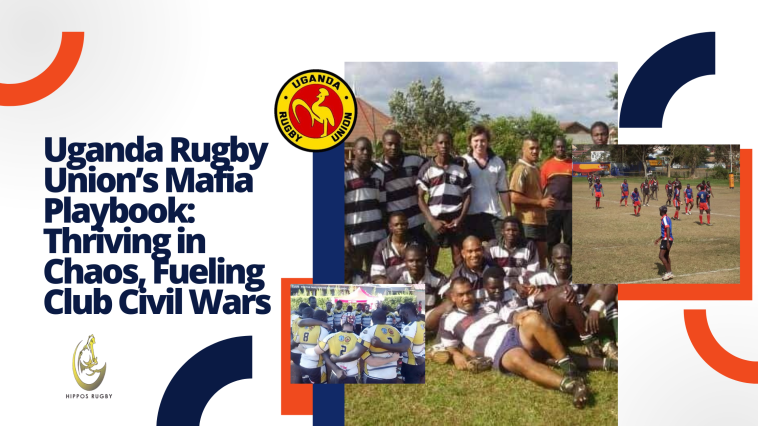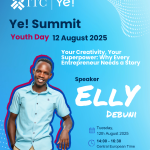If chaos was a sport, the Uganda Rugby Union (URU) would not only dominate Africa but would host the World Cup for it every other year, and still find a way to sabotage their own victory parade. That’s what is happening at the moment. In a country where rugby’s growth hinges on trust, leadership, and corporate goodwill, the Union has instead perfected a mafia style playbook of factionalism, selective enforcement, and backroom interference that leaves clubs fighting each other like alley cats over a single fish head.
Take Jinja Hippos Rugby Club, Or should I say Hippos RFC, depending on which faction’s social media you visit. This is sad at all levels. What was once one of Uganda’s brightest rugby stories or even Africa, a symbol of community grit and competitive underdog spirit, is now the scene of a governance bar fight. Like any good URU manufactured crisis, it has all the hallmarks, from the contested leadership, name confusion, mysterious new executive committees sprouting overnight, and the inevitable police cameo.
To appreciate how far the Hippos have fallen, one must first understand how they rose. Founded around 2013 by Jonan Manzi, a former player who had just retired, the club emerged from the ashes of the Nile Rugby Football Club’s collapse. Manzi moved to Jinja with the vision to reignite rugby in the East. The story is that he was inspired by a conversation with the then Mayor of Jinja, who explained that hippos are a symbol of the town, Manzi christened the club the Jinja Hippos. Manzi deserve about 4 chapters if a memoirs of Rugby administrators is ever curated, it’s one project that would go places more than Rugby as a product with the demand for African Literary works.
He launched the club under his company, Illumina Uganda Limited, which officially owns it. Early on, Manzi was the coach, team manager, physio, sponsor, medic, chairman, and trustee all rolled into one. If you have been around Ugandan Rugby you can try to relate to how crazy or possessed he was about the project. His personal investment was staggering over 188 million shillings in the first year alone and more than 250 million shillings in the first three years according to him, and funny thing if you sit down and evaluate his words, everything is logical.
The Hippos steadily climbed the ranks. Their first coach was Joseph Bugabo, but it was Saidi Atibu’s leadership that truly set the team on course. After winning the Eastern Region Championship, the club was promoted to Uganda’s top flight league in 2017. In 2020, Robert “Soggy” Seguya took over coaching duties and helped position the Hippos as serious contenders against the so called “big three” clubs before his untimely death in December 2021. Atibu returned as interim coach in 2022 and led the club to a historic National 7s title, the first upcountry team to claim it. The Hippos’ winning campaign was built on persistence, finishing fifth in the first circuit, reaching two finals, winning the Kyabazinga 7s, and finally clinching the overall title at the Buffaloes 7s.
Yet amid this success, a toxic leadership crisis has fractured the club. Founder and trustee Manzi finds himself at odds with a new executive committee led by Chairman Joshua Wakabi and Vice-Chairman Joab Tamiti, elected in November 2024 under URU supervision. Manzi dissolved that committee, appointed a parallel one, and declared himself chairman, citing governance and accountability concerns. His position rests on his claim that Illumina Uganda Limited owns the club and that the constitution grants him power to appoint and dismiss leadership. Adding complexity, Manzi offered 1,000 shares for sale at 500,000 shillings each, splitting proceeds between Illumina and the club.
A major bone of contention is the Hippos Foundation, launched by technical director Tim Grover to raise funds from abroad. Manzi alleges a lack of transparency, resulting in a police raid on Grover’s home, like just try imagining police raid your home for an amateur sport that most likely take money from you and you never get anything in return. In May 2024, URU’s directive to revert the club to its 2013 constitution effectively empowered Manzi’s faction. Subsequently, Wakabi was denied entry to the URU Annual General Meeting this year, with URU officially recognizing Manzi as the club’s representative. This schism has split players and fans. Most players and supporters back Wakabi’s group, but the official endorsement rests with Manzi. Meanwhile these players and fans have not seen Manzi in awhile.
This is not just a Jinja mess, it is a systemic warning. I personally during my active time in the administration of Kyambogo Rugby Club, I have witnessed the Union’s “technical injustices” firsthand. Kyambogo, after a long dormancy, since being relegated in the early 2000s got active again in 2016 in the Central Uganda, and it’s bid to gain promotion it was sidelined in favor of KOBs despite having no right to be promoted because KOBs management had already another side in the league. On that incident, this funny move allowed Walukuba, Jinja Hippos’ brother team, to get promoted which is a classic case of URU mismanagement benefiting one faction while disadvantaging another. The reality is that every Club has benefited from URU’s incompetencies and also every Club has had its day to be the victim of the technocrats that sit under the stares of the tennis court.
URU’s shifting regional playoff representations from time to time is an example of how they do as they want. There was a time when one team represented a given region, there was a time when two team represented a given region depending on who the Union wanted to get promoted. Expanding the elite league from eight to twelve teams during the last 15 years as also been about who the Union wants to stay or get promoted. Of course the Union officials will say that they do things basing on the bigger grander strategic plan but that plan also has opaque policies like the unimplemented 15s University league, which reflects selective enforcement disguised as grand strategy for the old men.
The saga between Kyambogo and URU even involved a special transfer window favoring Victoria University, using ineligible players to qualify for the league. URU admitted this through an apology tucked inside a Technical Committee report. Worse still, after Kyambogo’s legal challenge stalled, URU ceased official correspondence with its active administration, instead dealing with the University Sports Tutor, Mr. George Wagogo. He took over the club for a game, after which Kyambogo failed to travel to a crucial Uganda Cup match. The Union’s moves seemed engineered to spark internal strife. Kyambogo is a hybrid club built by its university alumni who are the backbone of the club, but not its owners. Once these alumni criticized URU’s incompetence, they were sidelined for the George guy, who didn’t know he was being given a short pass into traffic that could never let him see the tryline.
Anyway enough with Kyambogo Rubgy Club but the civil war at Jinja Hippos mirrors this dysfunction. The club itself is a product of the Nile Rugby Club breakup that formed both Walukuba and Jinja Hippos, that’s why the two clubs just made decade in existence. While Manzi’s contributions to Jinja Hippos are undeniable, his recent actions, particularly as the team stood on the brink of a historic Ugandan 15s elite league triumph are very destructive. Excluding one faction from the AGM might be an acceptable boardroom dispute, but seeing players who ignited local rugby in 2025 sit out 7s tournaments because the team is fractured is deeply troubling. I say troubling because some Kyambogo Rubgy Club players, broken by similar boardroom wars, have never touched a rugby ball again and don’t even watch the sport. The Jinja women’s side is also caught in this civil war, which is nothing short of a hot conflict. The Union siding with Manzi, who was permitted to register new players before the season’s end to push his agenda, only fans the flames. Someone is going to scream transfer windows don’t affect international players but when Mbale did a move on Warriors the latter was disqualified.
The Hippos now flood socia media with statements at a rate Kyambogo Rubgy Club can’t keep up with after it was nicknamed Appeals Rugby Football Club. This turmoil threatens to reduce Jinja Hippos to a “what if” story, a tragedy for Ugandan rugby. Jokes aside.
The Union, composed of the clubs themselves, must handle this crisis better. Yet, their pattern is painfully predictable. They fuel internal disputes by backing parallel leadership structures. They avoid swift conflict resolution, allowing uncertainty to become the norm. They intervene only when factions exhaust themselves, positioning as saviors. Clubs end up wasting time in boardrooms instead of pitches, players’ careers stall, sponsors withdraw, and fans grow disgusted by the off field circus.
The Jinja Hippos coach was named Coach of the Season after a near-perfect league run. Imagine the potential if the club’s administration matched that excellence instead of undermining it. Meanwhile coach of the season should be part of the national team structure, any that is a story for another day.
This dysfunction is no accident. It is deliberate. Chaos centralizes power. Divided clubs rely on the Union, which dictates fixtures, discipline, and funding with minimal resistance. It is like keeping your neighbors in debt so they must borrow sugar, except in this case, the currency is control over sport and community. This culture infects every corner of the league. New clubs enter a jungle where survival means silence. Established clubs, no matter how clean internally, face arbitrary compliance reviews, meanwhile what happened to those cameras they installed at rugby venues speaking of compliance.
Before concluding, solutions demand attention. Club constitutions and URU statutes must be harmonized, transparent, and enforceable but most importantly they must be inclusive, all clubs can’t have the identical administrations. No more shadow committees or whispered directives. Leadership changes must be transparent and publicly logged with both URU and the National Council of Sports. Rugby disputes deserve an independent arbitration panel with firm deadlines. Justice delayed is club suicide.
Financial and governance transparency is non-negotiable. Corporates invest in stability, not shadows. Player contracts must be tied to officially recognized club entities, not to whoever claims control of the logo that week. Imagine people asking if that is the real Nile Rapids playing… . URU executives must face annual Q&A forums with clubs, sponsors, and fans. If you run rugby like a cartel, be ready to answer to the public footing the bills. The podcasts are doing enough but URU needs to organize a special event apart from the AGM when questions are answered and dialogue takes the weekend.
Controversies are poison. Sponsors are not charities. They are risk managers. The moment a brand’s logo risks appearing on jerseys caught in police raids and leadership fights, marketing managers cut the cord. Fans are not immune. Rugby already battles for attention against football, netball, and athletics. Scandals turn casual spectators into permanent absentees. Uganda’s population is growing, when the middle classes materializes, it may ditch rugby for golf. Every unresolved leadership battle signals instability and warns sponsors their money is safer elsewhere. Worse, it tells young players that politics trumps performance, the ugliest recruitment poster possible.
The Jinja Hippos debacle is another brick in the crumbling wall of Ugandan rugby governance. URU has mastered managing decline under the guise of oversight. It is a strategy benefiting the few at the many’s expense. But rugby remains worth saving. Players deserve better. Fans deserve better. Even sponsors who still believe in sport’s uniting power deserve a system that won’t ambush them with scandal.
If URU refuses to change, the chaos it nurtured will become the reason Ugandan rugby collapses. Then no one will be left to blame, no faction left to play savior, and no jersey left worth wearing.
This post was created with our nice and easy submission form. Create your post!






